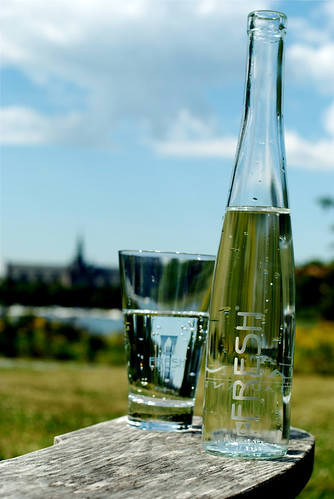
I grew up in a charming and picturesque resort nestled at the base of the beautiful Cascade mountain range in Central Oregon. The Deschutes river flows wide and calm through the resort, and nearby you'll find the Little Deschutes tagging along like a younger sibling. So you can see it was aptly named Sunriver.
We moved there from the Bay Area when I was around five, my parents wanting a more wholesome place to raise their children. We frolicked in the lakes and rivers in summer and skied the powdery slopes of Mt. Bachelor in winter. Best of all, we drank crystal clear mountain water fresh and cold from the tap.
Some people say you can't taste water, but after growing up with clean water I certainly can. Too often water tastes metallic, too "minerally," or like you're drinking a swimming pool. When your thirst needs to be quenched, that's fine I suppose, but outside of Sunriver I prefer my water well filtered.
One thing I had never considered, until recently, is how the taste of water affects the flavors of food and wine. I don't know why this never occurred to me. I mean, if you brush your teeth you know that then drinking a glass of orange juice is going to taste horrible. So why would it not dawn on me that salt, minerals, and chemicals in water could alter the flavor of the wine I so carefully selected?
I sat down with Chef Jason Wilson of Crush and Sam Giertz, CEO North America of Nordaq Fresh, for my first ever water tasting. Nordaq Fresh is a purification system that filters impurities and unwanted flavors from tap water while preserving the water's natural salts and minerals. Sam suggested that I cleanse my mouth first with the Fresh water, so I swirled it around a bit. The best way I can describe this water is simply "neutral" - just the way I remembered my Sunriver water, only much better. I took another sip, then I tasted the nice chilled Chardonnay that Jason had selected. Very nice. I did the same with the tap water, then tasted the wine again. Good, but not great. I mean, it was a lovely wine, of course it would taste great, right? But I could definitely taste the difference. We repeated this process again and the distinction was remarkable. The flavor of the wine had much more pronounced depth than I could taste with just plain tap water.
It was like the water gave the wine Dolby surround sound.
In 2007, Thomas Keller was invited to attend a culinary event in Stockholm where he was first introduced to the Nordaq system. Seeing the potential for its application in his own restaurants he had the system installed in The French Laundry, Per Se and Buchon. Now, more fine restaurants around the U.S. are following suit and having the system installed.
But it goes beyond taste. Nordaq Fresh is water with a conscious. Because the filtration system comes with water bottles (and beautiful sleek and sexy ones to boot) restaurants are significantly reducing the amount of glass they are recycling. Jason says he has saved roughly four thousand bottles per year (about five thousand pounds of glass) from recycling. Beyond that there's the elimination of the transportation of bottled water from production plant to restaurant to recycling center.
To me, that alone makes everything taste better.











Comments
April 7, 2009
Hi Sheri,
I read your blog on Nordaq Fresh and agree its a cool concept. I know there are a few other companies that make this kind of product. You should look into Natura Water as well. Its kind of the same concept. I found it in Gotham Bar and Grill in NYC and also saw it at the 4 Seasons while staying there. Like you said about Nordaq, filtered/purified water is definitely good.
April 22, 2009
Did you do the tasting blind or did you know which was tap and which was Nordaq? I don't doubt that the results would've been similar, but since the brain is the main organ of taste (see, for example, http://www.gourmet.com/magazine/2000s/2004/08/shattered_myths) it's practically impossible not to be swayed by expectation.
June 16, 2009
I did a blind tasting. Thanks for sharing the article above. Very interesting!